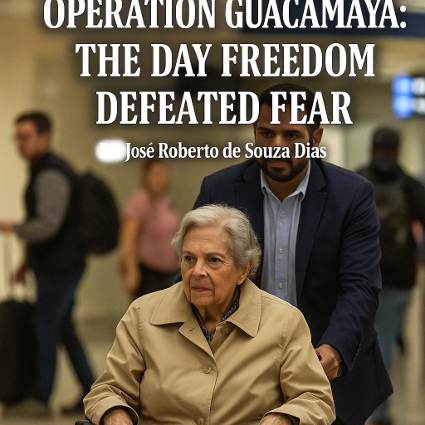Read, Comment, Share –
Operation Guacamaya – The Day Freedom Defeated Fear
By José Roberto de Souza Dias – Two Flags Post
In the hush of a Venezuelan night long silenced by fear, what echoed was not the crack of gunfire, but the flutter of liberty. Under the codename “Operation Guacamaya” — named after the vibrant macaw that soars free over the Caribbean skies — a surgically precise mission unfolded, orchestrated by U.S.-linked intelligence forces and regional allies. The objective: extract five Venezuelan opposition members from the Argentine embassy in Caracas, where they had remained in political limbo for over 400 days.
The timing was perfect. President Nicolás Maduro was away in Moscow. With the regime’s attention distracted, the opportunity opened like a breach in an iron curtain. And through it slipped freedom. The operation was swift, invisible, and politically devastating.
According to confidential sources cited by international agencies, the entry and exit of the extraction team remain shrouded in secrecy. Some point to underground access, others to aerial drop-off. But the result was unambiguous: five high-profile dissidents vanished from the embassy, without a trace left for Caracas to condemn.
Curiously, Brazil, which had assumed unofficial custody of the Argentine embassy after diplomatic ties between Argentina and Venezuela were severed, was not informed. This omission, whether strategic or imposed, now raises uncomfortable questions about Brazilian neutrality in moments when silence can resemble complicity.
Yet the most symbolic moment of the mission came not in Caracas, but at a quiet airport elsewhere. Corina Parisca, the 85-year-old mother of opposition leader María Corina Machado, boarded a flight to Bogotá, escorted in a wheelchair. The regime called it a humanitarian departure. The resistance called it what it was: a rescue. As the matriarch of Venezuela’s democratic spirit disappeared into the horizon, the regime’s armor cracked just a little more.
No official word came from Caracas. As is customary with authoritarian regimes, what is left unsaid speaks louder than a thousand declarations. Meanwhile, voices from Washington and Buenos Aires rang clear. Argentina’s President Javier Milei thanked the United States. Senator Marco Rubio called the mission “a strategic strike against Latin tyranny.”
But Operation Guacamaya is more than a thrilling tale of geopolitical chess. It is a warning. In an era where censorship is law and exile is policy, freedom of expression needs more than applause. It needs allies. It needs action. It needs courage.
Words are no longer enough. Western democracies must understand that liberty demands movement, diplomacy with a spine, and sometimes, bold intervention. Guacamaya is proof that even in silence, liberty can fly.
Its name is honor. Its gesture is solidarity. Its symbol is an old woman departing with dignity. Its promise is a continent where no embassy will ever again be a last refuge for an idea.


